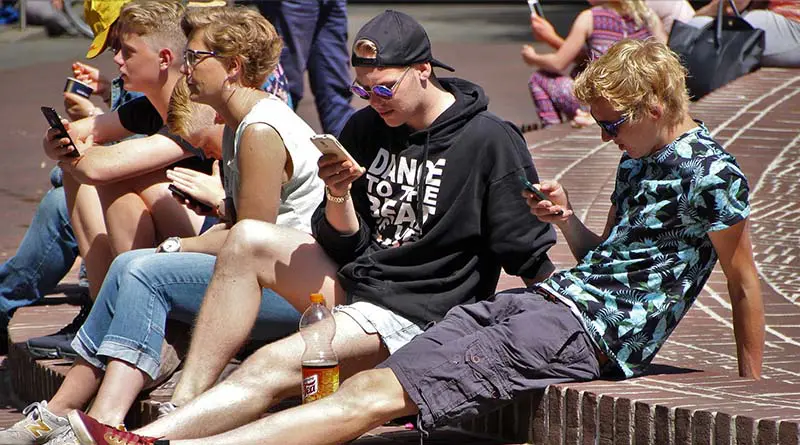Have you noticed the travel zombies suffering from screen addiction yet?
They’ve overrun the Orlando theme park where Lisa Ann Schreier works. “I’ve seen entire families walking around completely oblivious to their surroundings, which is pretty sad,” she says. “To say nothing of people literally walking into other people.”
Jonathan Schroeder, a culinary educator based in Wilmington, Del., has run into them, too. Visiting a San Francisco restaurant recently, he spotted a vacationing family at a table across the room. All of them were staring at their screens. They hardly spoke to each other.
“Whenever the servers came around, the adults were slow to respond,” he remembers. “And when the food came, they were slow to eat and then, of course, they complained their food was too cold and sent it back.”
Maybe they needed to be educated. Maybe we all do.
Screen addiction is killing travel
Why? Because screen addiction is killing travel.
“The problem is more than significant,” says Dwight DeWerth-Pallmeyer, who teaches communication studies at Widener University in Chester, Pa., and is working on a documentary about screen addiction. “It’s mind-blowing.”
The issue is simple: Travelers are tied to their devices 24 hours a day. The travel industry wants it to be that way. The results can seem funny, like when park guests collide at Disney World, but they can also be tragic, and over the long term, they are troubling. Worst of all, there’s no quick fix.
To get an idea about how out of control the problem may be, look no further than a recent Baylor University study of college students, which found that women spend an average of 10 hours a day on their cellphones, while male students spend nearly eight hours. The research, published in the Journal of Behavioral Addictions, also noted that roughly 60% of college students admit they may be addicted to their cellphone. No similar studies have been conducted on travelers, but look around on your next flight or commute and tell me what you think.
What is the antidote to screen addiction?
Finding the antidote won’t be easy. For starters, your electronics can be a key to a quick resolution of a customer service problem. An answer is sometimes a Facebook message, tweet or email away. For example, the Hilton Honors app allows you to use your smartphone as a digital key, liberating you from those plastic room keys but requiring you to keep your device with you at all times. Royal Caribbean’s new app allows you to check in, access your room and order drinks. All you need is your phone.
“It’s getting harder to unplug,” observes Eileen Gunn, a family travel expert and frequent traveler.
But not impossible. Resorts offer digital detox packages that can help you (see below), and laws designed to prevent distracted driving are passing left and right. There are plenty of good reasons to sit up and pay attention while you’re traveling beyond your personal safety. (Here’s how to get a refund on a nonrefundable airline ticket.)
Relationship expert April Masini has a long list. Try taking a romantic vacation with just you, your sweetie and your cellphone. “Screen addiction will dash a romantic vacation — and yes, even a honeymoon,” she says. It’ll also throw a wrench in the spokes of your family time and threatens to turn every vacation into a working vacation, since the office can reach you 24/7. (Related: Did your low airfare disappear? Blame dynamic pricing.)
“How exotic can a vacation be, when you’ve got all your online creature comforts on the screen in front of you?” she asks.
Plus, it’s rude. And don’t take my word for it. Remember this story the next time you’re in a waiting area and someone has a loud conversation on a computer or phone. Yeah, that.
Common sense
“Using common sense and discretion enables us to participate in travel as well as respecting those around us,” says Jacquelyn Youst, president of the Pennsylvania Academy of Protocol.
So the next time you see a travel zombie veering off the road or bumping into a fellow pedestrian, remember that their behavior isn’t just reckless and unmannerly. It’s also taking everything away from travel that makes it special.
Snap out of it, for goodness sakes!
How to not become a travel zombie
• There’s an app for that. A little ironic, but stay with me. An app such as AT&T’s Drive Mode can keep you focused when you’re driving. My colleague Jennifer Jolly reviewed other options that can help. There is, of course, always the “off” button or “airplane mode” to stop the barrage of notifications.
• Set hours for your tech. You can set your “do not disturb” hours on a device such as an iPhone when you’re traveling to ensure you’re completely focused on the experience. For Android users, there’s also an app that can set more specific times and dates.
• Check into rehab. Hotels such as the Renaissance Fulton Pittsburgh Hotel offer a “digital detox” package. The hotel’s staff removes the television and iPod dock station and replaces them with literary classics, board games and playing cards. Guests also need to hold up their end of the deal by surrendering laptops, phones and other devices at check-in.




